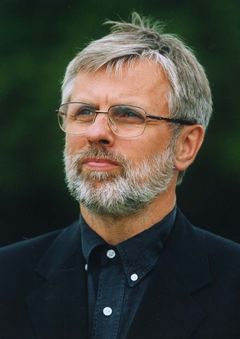Eugeniusz Knapik: String Quartet - 3 Songs – Tha’ Munnot Waste no Time
Eugeniusz Knapik: String Quartet - 3 Songs – Tha’ Munnot Waste no Time

1. String Quartet Kwartet Śląski (Silesian Quartet), 2001 2. Three Songs for Baritone and Piano Jerzy Mechliński - baritone Eugeniusz Knapik – piano, 2002 3. Tha' Munnot Waste No Time for Three Pianos and Clarinet Iwona Mironiuk, Szabolcs Esztenyi, Eugeniusz Knapik - pianos Aleksander Romański – clarinet, 1999
Eugeniusz Knapik, born 9 VII 1951 Ruda Śląska, Poland.
Between 1970 and 1976, Eugeniusz Knapik studied composition under Henryk Mikołaj Górecki and piano performance in the class of Czesław Stańczyk at the State Higher School of Music in Katowice. In 1976 he received a French government scholarship that allowed him to study composition under Olivier Messiaen in Paris. He is currently a professor in the Department of Composition, Conducting and Music Theory of his alma mater. Since 1992 he has also headed the Computer and Electro-acoustic Music Studio at the school. He appears in concert as a pianist in both Poland and abroad, performing primarily piano works of the 20th century. He has recorded for radio and television as well as a number of music publishers.
Eugeniusz Knapik has garnered numerous awards as a composer and pianist. In 1976 these included an award at the Polish Piano Performance Festival in Słupsk and second prize at the Young Composer's Competition of the Association of Polish Composers for his work titled "Le Chant for soprano and orchestra" (1976). These were followed one year later by third prize at the International Chamber Music Competition in Vienna for his "Concerto grosso for chamber orchestra" (1977). In 1979 Knapik collected the first prize at the "Młodzi Muzycy Młodemu Miastu" / "From Young Musicians To a Young City" Festival in Stalowa Wola for his "Corale, interludio e aria for flute, harpsichord and strings" (1978), while in 1985 he received the S. Wyspiański Prize for "Wyspy / Islands for string orchestra" (1983). On two occasions, his works were chosen to represent Polish State Radio during the UNESCO International Rostrum of Composers in Paris: in 1978, "La flute de jade" for soprano and orchestra (1973) received an honorable mention and in 1984 his "Kwartet smyczkowy / String Quartet" (1980) was awarded the first prize. During the same year, Knapik collected the annual award of the Association of Polish Composers and an Award of the Minster of Culture and Art, and in 1985 he received the Polyhymnia Prize for his chamber music works.
In 1988, commissioned by the director of the Opera la Monnaie in Brussels, Knapik began working on an operatic trilogy titled "The Minds of Helena Troubleyn" based on a text by Jan Fabre. "Das Glas im Kopf Wird vom Glas", part one of the trilogy, premiered in 1990 at the De Vlaamse Opera in Antwerp. Part two, titled "Silent Screams, Difficult Dreams", had its world premiere in 1992 at the Documenta IX contemporary art festival in Kassel. The first-ever live performance of part three, "La liberta chiama la liberta", took place in 1996 during the "Warsaw Autumn" International Festival of Contemporary Music. Knapik also worked closely with Jan Fabre in creating three ballet productions: "The Sound of One Hand Clapping" (1991), "Da un'altra faccia del tempo" (1993), and "Quando la terra si rimette in movimento" (1995).
Eugeniusz Knapik debuted as a composer along with Andrzej Krzanowski and Aleksander Lason at the "Młodzi Muzycy Młodemu Miastu" / "From Young Composers To a Young City" Festivals in Stalowa Wola. Between 1975 and 1980 events in this series included eleven world premieres of works by the three composers, referred to as "Pokolenie '51" / "Generation '51" based on their year of birth. Knapik premiered two of his works in Stalowa Wola: "Tak jak nad brzegiem morza / Just Like on the Seashore" for instrumental ensemble and audiotape (1977), and "Corale, interludio e aria" for flute, harpsichord and eleven string instruments (1979).
Knapik was most decidedly an "oppositionist", drawing more deeply than anyone on tradition. His style is best described as "New Romanticism", a term applied to those who were introduced to the pubic in Stalowa Wola, at both the time of their debut and later.
Romantic in its expression, Knapik's pieces are notable for the outstanding, clear and singular compositional skills they embody and characteristic for the increased importance of melodic elements. With increasing frequency, melodies are beginning again to determine the forms of musical works. ---http://en.chopin.nifc.pl
download: uploaded filecloudio yandex anonfiles 4shared mediafire solidfiles mega nornar








